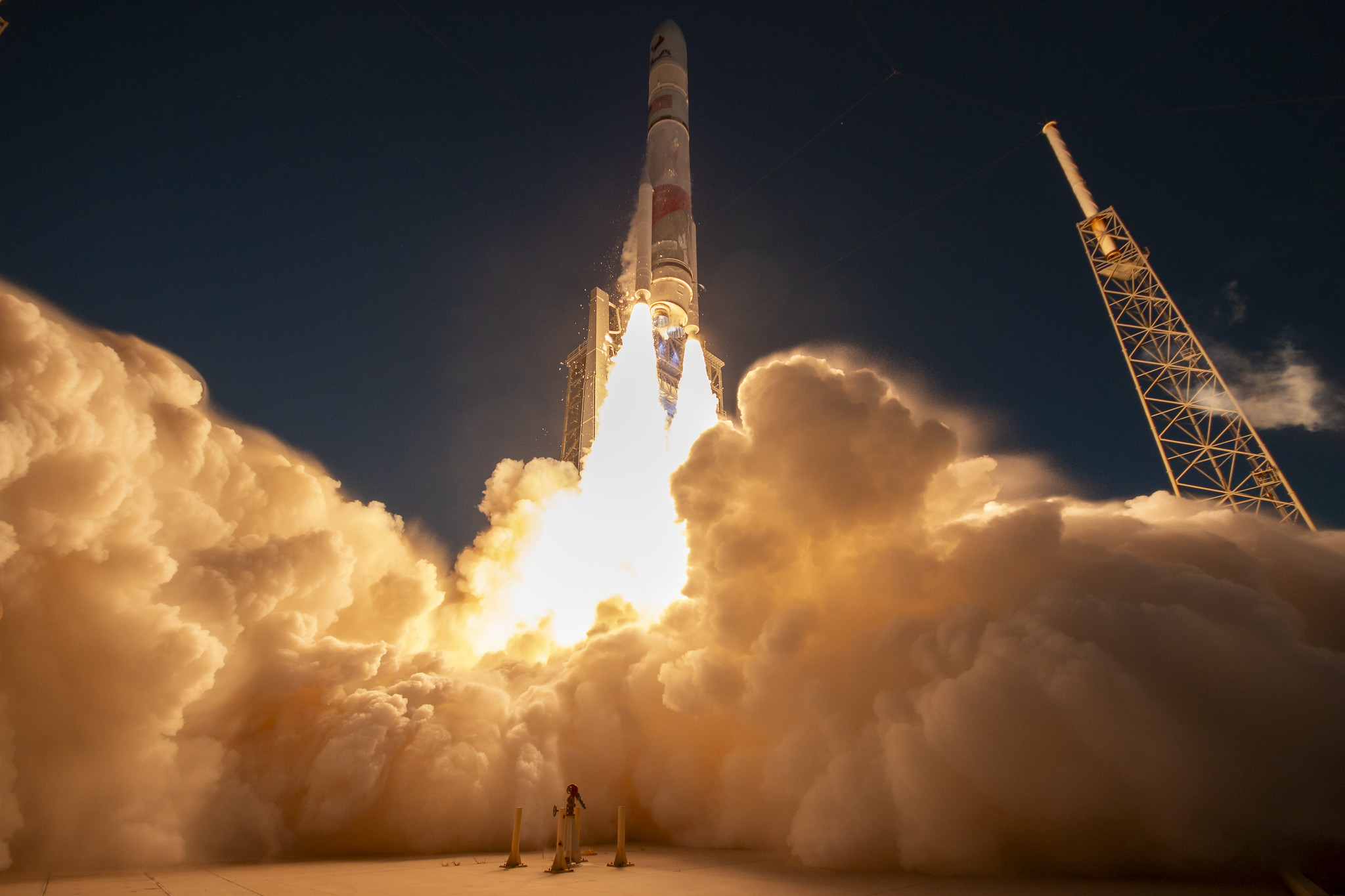Boeing (NYSE: BA) investors just can't seem to catch a break.
As a 50% owner of space company United Launch Alliance (Lockheed Martin(NYSE: LMT) owns the other 50% of ULA), Boeing should have gotten a boost earlier this month when ULA "successfully" launched its Vulcan Centaur heavy lift rocket for the second time ever.

Image source: ULA.
There's a reason I put "successfully" in quote marks, however.
See those two big gouts of flame in the photo up above? Those are firing GEM 63XL solid rocket boosters (SRBs), built and supplied to ULA by Northrop Grumman(NYSE: NOC). They give the Vulcan first stage a bit of extra oomph to help lift it into orbit, then fall away and let Vulcan's main engines, built by Jeff Bezos' Blue Origin space company, and then the Centaur second stage, finish the job.
But Vulcan had a little problem with its SRBs early in the launch: One of the rocket nozzles fell off.
A view from @dwisecinemahttps://t.co/1gdS8FOXoWhttps://t.co/1Ni6yyTWZ1pic.twitter.com/7foZTq75Gf
-- Chris Bergin-NSF (@NASASpaceflight) October 4, 2024
Good news and bad news
The good news is that losing a nozzle only decreased the rocket's efficiency. The fuel still burned. It still got pushed out in the right direction (i.e., down). It just didn't get directed straight down, and sort of billowed out in a more generalized downward direction.
"The net effect" of all this, ULA CEO Tory Bruno told SpaceNews on Tuesday, is that the SRB suffered a loss of "less than 2% of the total impulse of the booster." With the other booster and the main engines still firing normally, and able to compensate, that meant Vulcan Centaur was able to reach orbit just fine. In fact, said Bruno, "I'm pretty sure that's our most accurate injection yet."
The Federal Aviation Administration seemed to agree.
As Ars Technica reported after the launch, it only took a few hours for the FAA to "determine no investigation is warranted at this time." Which is kind of interesting, when you consider that various SpaceX rockets have been grounded for much smaller offenses, such as occasionally landing its reusable first stage less than 100% perfectly (no other rocket but SpaceX's can land back on Earth at all) or deorbiting its disposable second stage in an "off-nominal" fashion.
Commenting on FAA's laissez-faire reaction to ULA's Vulcan losing rocket parts en route to orbit, Ars' Eric Berger deadpanned: "FAA says nah, we're good."
FAA says nah, we're good, after Vulcan booster issue.https://t.co/C0IItscd4C
-- Eric Berger (@SciGuySpace) October 4, 2024
What this means for Boeing and Lockheed investors
Investors in Boeing and Lockheed, the two 50-50 owners of ULA, breathed a sigh of relief at this.
You see, Vulcan needed to fly successfully two times in a row in order to qualify for "certification" to fly national security missions for the U.S. Space Force. If FAA decides to forgive and forget Vulcan's little mishap on its second launch, then that means the rocket is now "certified," and ULA will be able to begin flying lucrative satellite launch missions for USSF and other security agencies, such as the National Reconnaissance Office.
This would be a big boost for ULA's business. At last report, the company had contracts to launch at least 25 national security missions for the Pentagon through 2027. Add in launches under contract with Amazon, to deploy the latter's Project Kuiper internet satellites, and ULA is targeting a launch cadence of 20 or more missions per year over the next few years.
Even at the sub-$100 million launch cost that Bruno is projecting for Vulcan, that would generate billions of dollars in annual revenue for the space company and its owners.
On the other hand, if the FAA changes its mind and decides that rockets disassembling themselves prematurely is something that ULA needs to fix, then certification could be delayed, ULA's revenue would take a hit, and by extension, so would Boeing's and Lockheed's.
Don't get me wrong. This is not a make-or-break decision for ULA, for Boeing, or for Lockheed. Commenting further on this month's anomaly, ULA's CEO assured investors that he's "experienced this type of anomaly more than once in my career," and is "pretty confident ... that we'll get to the bottom of this pretty quickly and move on."
Still, the sooner that happens, the sooner ULA, Boeing, and Lockheed Martin investors can start making billions off of this rocket.
Should you invest $1,000 in Boeing right now?
Before you buy stock in Boeing, consider this:
The Motley Fool Stock Advisor analyst team just identified what they believe are the 10 best stocks for investors to buy now… and Boeing wasn’t one of them. The 10 stocks that made the cut could produce monster returns in the coming years.
Consider when Nvidia made this list on April 15, 2005... if you invested $1,000 at the time of our recommendation, you’d have $831,707!*
Stock Advisor provides investors with an easy-to-follow blueprint for success, including guidance on building a portfolio, regular updates from analysts, and two new stock picks each month. TheStock Advisorservice has more than quadrupled the return of S&P 500 since 2002*.
*Stock Advisor returns as of October 14, 2024
John Mackey, former CEO of Whole Foods Market, an Amazon subsidiary, is a member of The Motley Fool’s board of directors. Rich Smith has no position in any of the stocks mentioned. The Motley Fool has positions in and recommends Amazon. The Motley Fool recommends Lockheed Martin. The Motley Fool has a disclosure policy.
